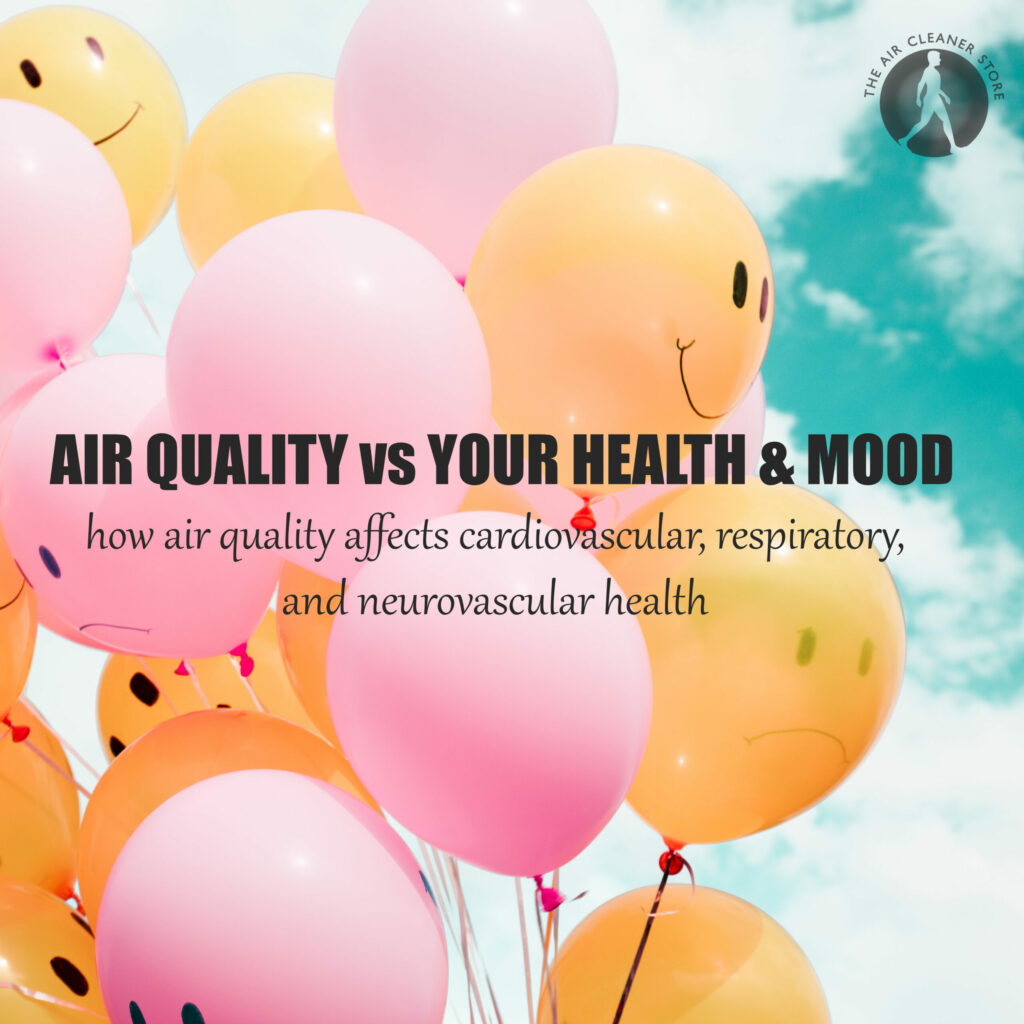Poor air quality can cause a variety of health problems. While it may be one of the last things we consider when we don’t feel our best, the environment and air play a massive role in our overall well being and quality of life. Before we consider how air quality affects mood, let’s explore some of the ways that air pollution has adverse effects on our cardiovascular, respiratory, and neurovascular health.
There are a wide variety of symptoms people experience when exposed to poor air quality. Among the most common are :
- Dryness and irritation of your eyes, nose, throat and skin
- Dizziness
- Fatigue
- Headaches
- Sinus congestion
- Nausea
- Watery eyes
- Shortness of breath
Being exposed to poor air quality for prolonged periods can also cause chronic conditions. These include:
- Asthma,
- COPD- chronic obstructive pulmonary disease,
- cardiovascular disease
- cancer
Research and studies show that polluted air can trigger changes in mood and behaviour and in some cases even be the underlying cause of mental health conditions.
Certain air pollutants have been linked to drops in productivity levels, creative thinking, learning as well as emotional stability and social behavior.
In this article we will take a deeper dive into the impact of the air on our mood and behaviour.
Environmental Illness or Multiple Chemical sensitivity
Multiple chemical sensitivity” (MCS), or “environmental illness” or “sick building syndrome” are all terms that describe the problems of exposures to pollutants that adversely affect our health.
The pollutants that trigger MCS or environmental illness can be of both biological and chemical nature. The most common biological irritants include:
- mold
- mold spores
- mycotoxins
- dust mites and dust mite waste.
When it comes to chemical pollutants , the list rapidly grows alongside the invention of new chemicals that our bodies are biologically not equipped to handle. Here is a brief overview of the most common chemicals that are associated to neurologic disorders:
How are environmental illnesses diagnosed?
Environmental illness can be difficult to diagnose.
One method doctors use is “An Exposure History Report”. It contains a series of questions about your home, workplace, occupation, habits, lifestyle, and hobbies. This can help you and your doctor discover what is making you sick. For a better understanding of environmental illness check out our blog “ Could you be suffering from environmental Illness?” where we cover what you need to do to discover which environments are the cause of your health issues.
How air can be affecting your mood.
Have you ever noticed that in certain environments you feel more energized or productive and focused? Or perhaps you find yourself to be more agitated, anxious , uncomfortable and sensitive or moody in certain places?
Although emotional behaviours are very complex, one thing that can influence your mood and emotions is the exposure to certain pollutants in the air.
A study done by Siqi Zheng – Associate Professor at MIT explores how air pollution influences people’s emotions and levels of happiness.
In the course of 9 months, social media data was collected and used as a real-time measure of people’s sentiment for separate cities in China. This was compared with:
- Daily local air quality measures
- PM2.5 (the concentration of particulate matter with diameters of less than 2.5 micrometers)
- Weather data.
A significant negative relationship was found between high PM2.5 concentration levels and people’s happiness. Interestingly, both women and individuals with higher income were more affected by air pollution. Poor air quality was shown to have a larger effect on people’s mood during weekends and holidays. In addition to air pollution, cloudy, or very hot or cold weather conditions also proved to be a factor in people’s mood. Finally, the emotional states of people living in the cleanest or dirtiest cities were the most influenced by air pollution. Why? Possibly because the group that lives in clean air is used to that fresh smelling baseline and is sensitive to the odor change with air pollution. Conversely, the group that lives with poor air quality has chronic health problems that are triggered when pollution becomes more severe.
Steps you can take to make sure your home promotes a healthy environment and mood for your and your family.
- Don’t allow smoking in your house.
- Improve your air quality by getting rid of sources of pollution.
- Increase the amount of fresh air coming into your home.
- Consider investing in a high quality air cleaner like HEPA.
- Keep a dry environment indoors to reduce exposure to mold and dust mites.
